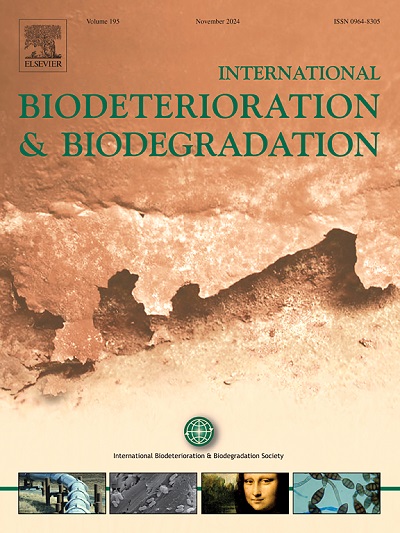利用微藻-细菌联合体减轻发芽大麦酚胁迫的生物施肥:土壤细菌的功能基因分析
IF 4.1
2区 环境科学与生态学
Q2 BIOTECHNOLOGY & APPLIED MICROBIOLOGY
International Biodeterioration & Biodegradation
Pub Date : 2025-03-24
DOI:10.1016/j.ibiod.2025.106070
引用次数: 0
摘要
生物肥料作为传统化学肥料的替代品,越来越受到人们的关注,特别是微藻-细菌共培养生物肥料(MBCFs)由于其协同作用而成为有希望的候选肥料。过量污泥由于其适当的营养成分和生物多样性而被认为是MBCFs的可持续来源。本研究探讨了MBCFs促进植物生长的可行性。以发芽大麦为模型植物,研究了MBCFs对酚胁迫的缓解作用。添加MBCFs后,即使在苯酚暴露的情况下,植物的发芽率、重量和长度等生长特性也有所提高。单胞菌属(Polaromonas)和桥胞菌属(Desmodesmus)分别是主要的微藻属和细菌属,它们具有降解苯酚和促进植物生长的特性。细菌功能基因预测揭示了几个可能的基因,包括gst(谷胱甘肽r -转移酶)和exbB(铁复合体外膜受体蛋白),促进植物生长。说明MBCFs具有促进发芽大麦生长、缓解酚胁迫的保护和促进作用。本文章由计算机程序翻译,如有差异,请以英文原文为准。

Biofertilization using microalgae-bacteria consortium for phenolic stress mitigation of sprouted barley: Functional genes profiling of soil bacteria
As alternatives to conventional chemical fertilizers, biofertilizers have gained attention, in particular, microalgae-bacteria co-culture biofertilizers (MBCFs) are promising candidates owing to their synergistic interactions. Excessive sludge has been considered a sustainable source of MBCFs due to its proper nutrient composition and biodiversity. This study investigated the feasibility of MBCFs in promoting plant growth. The sprouted barley, selected as a model plant, was exposed to the phenolic stress, and its alleviatory effect by MBCFs was evaluated. The plant's growth characteristics such as germination rate, weight, and length were enhanced after adding MBCFs even under phenol exposure. Desmodesmus and Polaromonas were predominant microalgae and bacteria genus, respectively, and those are attributed to possess the phenol-degrading and plant-promoting properties. The bacterial functional gene prediction revealed several putative genes, including gst (Glutathione R-transferase) and exbB (Iron complex outermembrane recepter protein), which act to promote plant growth. This study suggests that the protective and promotive functions of MBCFs enhance the growth of sprouted barley and alleviate phenolic stress.
求助全文
通过发布文献求助,成功后即可免费获取论文全文。
去求助
来源期刊
CiteScore
9.60
自引率
10.40%
发文量
107
审稿时长
21 days
期刊介绍:
International Biodeterioration and Biodegradation publishes original research papers and reviews on the biological causes of deterioration or degradation.

 求助内容:
求助内容: 应助结果提醒方式:
应助结果提醒方式:


